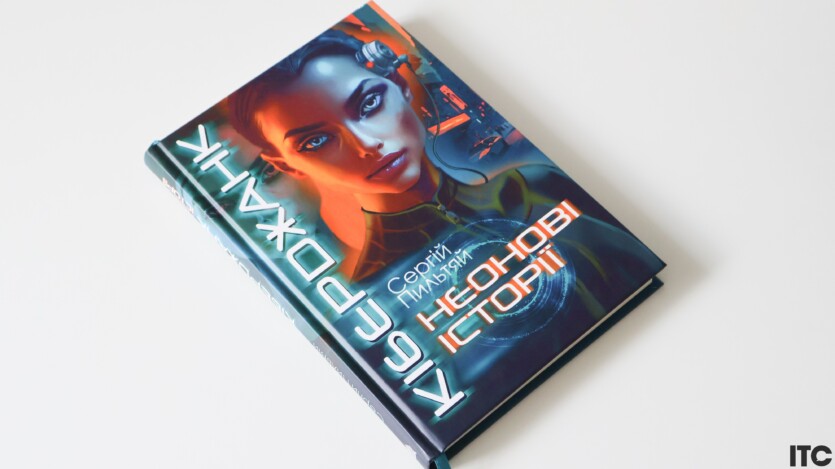
A few days ago, the winners of the Eurocon awards, the annual European science fiction convention, were announced in Rotterdam. There is also the «Crisalis» award, given to a writer or artist who has made a strong statement with their debut work. This year, along with other authors, it was awarded to Ukrainian author Serhiy Pylytiai. It is about his book «Cyberjunk. Neon Stories» from the publishing house «NK-Bogdan» we will talk about today.
«Cyberjunk. Neon stories» / «Кіберджанк. Неонові історії»
Author Serhiy Pyltyai
Publisher Study book «Bohdan»
Language Ukrainian
Number of pages 240
Cover Solid
Year of publication 2024
Size 145×215 mm
Website bohdan-books.com
«Cyberjunk. Neon Stories» — is not a novel, but a thematic collection that includes a novel and several short stories. Therefore, for the sake of interest, I will only tell you about the beginning of the novel because the short stories will contain spoilers.
All the stories in the book are set in a city that looks very much like the Kyiv of the future. The city is divided into two parts after the Great War. The Right Bank is modern and developed, with neon signs, supercorporations, and life that are classic for the genre. And the Left Bank — shows even more classic «high-tech low life». This is a gray area where skilled hackers and hermits live as far away from the authorities as possible in dilapidated houses and abandoned factories. Here, they spend a lot of time on the Internet and earn their living by doing dark, daring, dangerous, and always illegal things.
Vladyslav meets his girlfriend Olya in a restaurant in the city. She invited him here to celebrate — she is hired by a large corporation «Globe». Suddenly, the girl feels sick and loses consciousness. She is taken to the hospital, and they say that it is brain damage. The boyfriend leaves Olya in the ward until morning and goes home, and when he comes back, no one knows where the new patient is. Moreover, there is no mention of her in the records, nor of the call, nor that she was even here. Vladislav has to find his beloved, and to do so, he has to return to hacking, which he used to do seriously.
«Cyberjunk. Neon Stories» is most closely related to the classic cyberpunk of Stevenson or Gibson. But it is much easier to understand and easier to write. The author still has deep meanings. For example, the expediency of cloning and consciousness transfer. The author asks whether it is normal, whether a clone can be considered a person if the clone does not know who he is? Can something that has been transferred from a biological body to a robotic one be considered a person?
Serhiy Pyltyai has also clearly added the influence of the current Russian-Ukrainian war, its consequences, and options for development. All of this makes the book even deeper and more diverse, but it is still far from the multi-layered nature of the cyberpunk classics.
«Cyberjunk» cannot be called a full-fledged cyberpunk work in its essence because, in my opinion, the author simply did not intend it to be. It is rather a stylization of this genre, honoring and respecting the legacy of the above-mentioned authors and their famous followers. It’s a kind of copying in order to create high-quality genre fiction.


The book is full of deliberate clichés, which are often pushed to the limit. If a hacker is a hacker, it’s only the coolest one, wearing leather and riding a motorcycle with mechanical implants. He easily breaks the defenses of the most powerful corporations and has sex with dangerous women.
If she’s a woman, she’s incredibly beautiful, young, with colored hair, a katana, and super ninja or assassin skills, or incredible knowledge of artificial intelligence. Or sometimes she’s a superhacker, too.
If she’s a corporation, she’s definitely a bad one, a big one, and a money-chaser. It always has a few mysterious developments in consciousness transfer and cloning. And someone always steals it, and then either tries to use it, sell it, or transfer it to another corporation.
We also have sex scenes and other similar manifestations of this brutal and explicit genre. And in my opinion, these are the worst few paragraphs with love scenes I’ve ever read. The author seems to choose the right and non-trivial words, but it still cuts the eye, ears, and brain at the same time. It’s actually unnecessary, even if it fits the style and conventions of classic cyberpunk.





«Cyberjunk. Neon Stories» I also liked the book as a publication. The book has a clear, bright, and genre-specific cover with a flavor of the 80s and 90s. It is immediately clear what awaits the reader, and that’s great. I also liked the different font, which for me is much more convenient than in other books by «NK-Bohdan», which we have already written about (for example, the «War of the old man», «Star agent» or«Sharpened blades»). It also has cool stylized flyleaves and a comfortable binding. I wish there were more books with it.



Spelling error report
The following text will be sent to our editors: